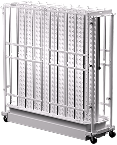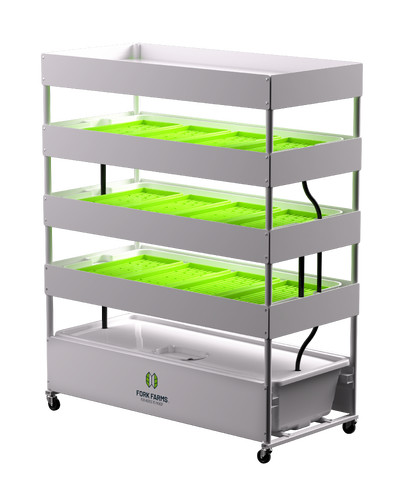Growing a Greener Future: How Hydroponic Farms From Fork Farms Reduce Food Miles and Waste
At Fork Farms, sustainability isn’t just a goal, it’s part of our fabric and ingrained in our mission. As organizations across sectors prioritize Environmental, Social, and Governance (ESG) metrics, our Flex Farms are emerging as a scalable solution to help a wide variety of organizations meet climate goals, strengthen communities, and operationalize sustainable food practices.
From reducing greenhouse gas emissions and conserving natural resources to fostering food equity and circular economies, Flex Farms offer an actionable pathway to measurable ESG impact.
Environmental: Cutting Carbon and Conserving Resources
Reducing Food Miles = Reducing Emissions
Traditional food systems are emissions-heavy, with produce traveling an average of 2,000 miles before it’s consumed. That journey involves carbon-intensive transportation, cold storage, and excess packaging, much of which ends up in landfills. Flex Farms eliminate the need for these supply chains by enabling hyper-local growing. From harvest to plate, your food travels feet, not miles, resulting in a significantly reduced carbon footprint. Food grown in a Flex Farm is actually taken from farm to plate within minutes which results in the most fresh and nutritious produce you can find.
Water Efficiency: Doing More With Less
In a world facing increasing water scarcity, conservation matters. In conventional farming, much of the water used to grow is lost due to evaporation and poor irrigation. Hydroponic farming uses very little water compared to traditional agriculture because the water solution is reused and recirculated through the system’s pipes. So, even though hydroponic systems depend primarily on water to grow fresh foods and plants, they still use much less water than plants grown via conventional agriculture methods.
In general, indoor hydroponic farming uses between 80 to 90% less water than traditional farming practices; our Flex Farms use 98% less water than traditional farming by leveraging closed-loop, recirculating hydroponic systems. This not only minimizes resource use, but also mitigates agricultural runoff, preserving local ecosystems.
Waste Reduction and Circularity
Roughly 40% of food in the U.S. is wasted, much of it before it ever reaches a plate. Flex Farms empower growers to produce only what’s needed, dramatically cutting spoilage, overproduction, and the costs—both economic and environmental—of food waste. By growing on-site and on-demand, organizations move closer to a zero-waste model that supports circular economy goals.
Social: Advancing Food Equity and Education
Empowering Communities
Flex Farms democratize access to fresh, healthy food. Whether in schools, healthcare institutions, or food pantries, Flex Farms place food production into the hands of the people who need it most. This contributes to improved public health outcomes, local economic development, and more resilient food systems.
STEM and Workforce Development
In educational settings, Flex Farms are more than food production tools, they’re immersive learning platforms. Flex Farms are making waves in more than 1,000 K-12 schools across the nation. Students gain hands-on experience in STEM, sustainable agriculture, and agribusiness. Many schools even offer hydroponic apprenticeships or entrepreneurship programs that align with college and career readiness standards.
Governance: A Scalable, Transparent, and Trackable Solution
Flex Farms are designed with data in mind. Our cloud-connected platform offers partners transparent tracking and reporting, helping organizations demonstrate real-time impact toward ESG targets. Metrics like gallons of water saved, pounds of food grown, and CO₂-equivalent emissions reduced can be integrated into annual sustainability reports, grant applications, and stakeholder communications.
We are proud to report that in 2023, our Flex Farms had the capacity to save 4.6 million food miles, 567 thousand pounds of food waste, 12 million kWh of CO2, and 32 million gallons of water in communities across the globe.
By investing in scalable, measurable impact solutions like Flex Farms, organizations can confidently meet internal ESG goals while contributing to a healthier planet and society.
Here are examples of the great work some of our partners are doing around Environmental, Social, and Governance (ESG) efforts.
Boys & Girls Club of Greater Green Bay
With the integration of Fork Farms' Flex Farms at the Boys & Girls Club of Greater Green Bay, club members are getting hands-on experience in hydroponic farming. But this initiative is about more than just growing produce. It's about cultivating curiosity, confidence, and a commitment to sustainability.
By growing fresh food right on-site, the club eliminates the need for transportation, cutting down on greenhouse gas emissions. That means zero food miles and a lighter carbon footprint. They’re also conserving water as Flex Farms use up to 98% less water than traditional farming, which is a huge win for environmental stewardship. And because the farms grow exactly what’s needed, when it’s needed, food waste is kept to a minimum.
Beyond environmental impact, the Flex Farms are an educational powerhouse. Members dive into STEM (science, technology, engineering, and math) by running and maintaining the farms themselves. It’s hands-on learning that encourages critical thinking and real-world problem solving.
They’re also gaining a new perspective on nutrition. When kids grow their own food, they’re more likely to eat it—and understand the value of healthy eating habits. Plus, the program introduces them to career paths in sustainability and agriculture, helping build a foundation for workforce readiness. This initiative is a perfect fit for the Boys & Girls Club’s mission: to create a safe, engaging space where youth can explore new interests and build skills for life.
University of Connecticut (UConn) Husky Harvest Food Pantry
At UConn's Stamford campus, students are growing their knowledge base and fresh food. With no traditional dining hall on-site, many students face limited access to fresh, nutritious meals. But thanks to the introduction of a Flex Farm, UConn is turning the challenge of food insecurity into an opportunity for innovation and impact.
The Flex Farm has quickly become a vital resource on campus. Producing up to 25 pounds of fresh lettuce every 28 days, it provides a steady stream of greens to the Husky Harvest Stamford Food Pantry, ensuring students have access to healthy options without needing to leave campus.
Growing food just steps away from where it’s consumed significantly reduces UConn’s carbon footprint. With no need for long-distance food transport, the campus is cutting down on emissions while modeling a more sustainable food system.
Beyond addressing hunger, the Flex Farm is also a hands-on learning opportunity. In partnership with the Biology Department, students are directly involved in maintaining and monitoring the farm. This collaboration gives them real-world experience in sustainable agriculture and food systems—skills that are increasingly valuable in today’s world.
This project has resulted in a smarter, more self-sufficient campus, one that cultivates solutions for today while preparing leaders for tomorrow.
At Fork Farms, we’re proud to power a movement where sustainability, innovation, and equity grow together. Whether you're a school district, a healthcare system, or a corporate campus, growing fresh food on-site is no longer just possible; it’s essential.
Let’s build a more sustainable food future together. Fork Farms can help you start your impact journey today.























